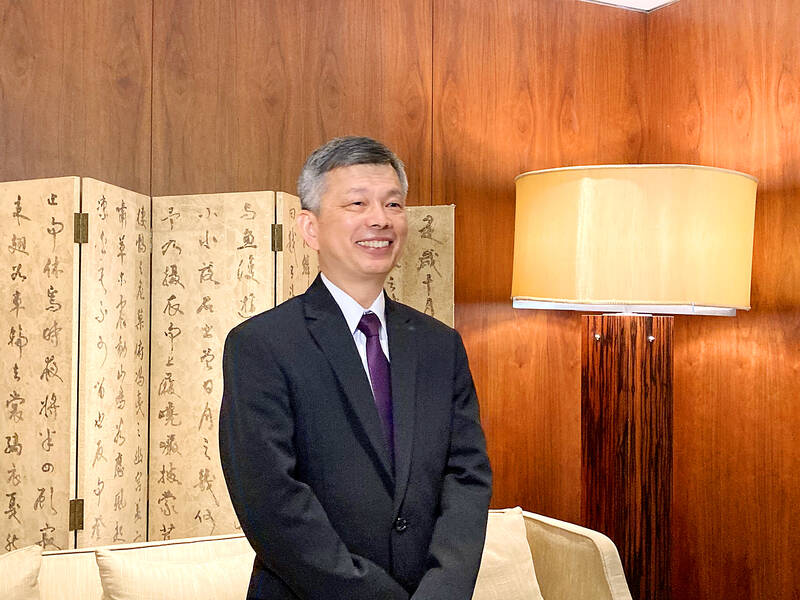Wafer probing service provider Chunghwa Precision Test Technology Co (中華精測) yesterday said it aimed to grow revenue by a double-digit percentage this year, benefiting primarily from rising demand for artificial intelligence (AI) and high-performance computing chips.
Increasing demand for products ranging from AI-enabled servers to edge devices with AI features such as smartphones, PCs and notebook computers are stimulating demand for the company’s advanced wafer probing services, boosting probe card revenue, Chunghwa Precision Test Technology president Scott Huang (黃水可) said.
“We are seeing exuberant development of the AI industry,” Huang said. “Adding AI features to smartphones and PCs is igniting new growth momentum. Forecasts by customers show that 2024 will be better than 2023, that is for sure.”

Photo: Lisa Wang, Taipei Times
The probing card business would be a major growth area this year, as the firm has secured new customers that develop smartphone chips, SSD controllers and Wi-Fi 7 chips, the company said.
As a result, Chunghwa Precision Test Technology is targeting a more than 40 percent increase in its probe card revenue contribution this year from 33 percent last quarter, Huang said.
Gross margin is expected to rebound to its normal range of between 50 and 55 percent this year, as the probe card business has better margins, he said.
The company’s gross margin improved to 49.8 percent last quarter from 48.8 percent in the third quarter last year, but is down from 51.1 percent last quarter.
Chunghwa Precision Test Technology focuses on designing and manufacturing printed circuit boards for semiconductor testers, such as load boards for final testing and probe cards for wafer probing.
With the industry’s inventory correction cycle approaching its end, the firm expects a lukewarm pickup in the first half, Huang said.
There is a lack of clear signs indicating a full recovery of demand for electronics, he said.
China, with its slowing economy and troubled property market, and Europe have shown weakness in electronics spending, he said.
“Consumer consumption is a major concern,” Huang said. “We have not seen spending on electronics coming back yet. Rather, people are spending their money on travel and luxury bags.”
The growth momentum would pick up in the second half of this year, he said.
Net profit surged 60.28 percent sequentially to NT$17.47 billion (US$554.74 million) last quarter, compared with NT$10.9 billion in the third quarter last year, marking the third straight quarter of profit and the best quarterly earnings last year as the company and its customers battled a prolonged inventory correction and sluggish demand.
The company’s operating profit was NT$15.51 million last quarter, reversing an operating loss of NT$17.24 million a quarter earlier.
Last year as a whole, Chunghwa Precision Test Technology booked an operating loss of NT$52.72 million.
Net profit plummeted about 96 percent to NT$29.5 million last year from NT$782.57 million in 2022, the weakest annual net profit since 2012.
Earnings per share dipped to NT$0.99 last year from NT$23.5 the prior year.

UNCERTAINTY: Innolux activated a stringent supply chain management mechanism, as it did during the COVID-19 pandemic, to ensure optimal inventory levels for customers Flat-panel display makers AUO Corp (友達) and Innolux Corp (群創) yesterday said that about 12 to 20 percent of their display business is at risk of potential US tariffs and that they would relocate production or shipment destinations to mitigate the levies’ effects. US tariffs would have a direct impact of US$200 million on AUO’s revenue, company chairman Paul Peng (彭雙浪) told reporters on the sidelines of the Touch Taiwan trade show in Taipei yesterday. That would make up about 12 percent of the company’s overall revenue. To cope with the tariff uncertainty, AUO plans to allocate its production to manufacturing facilities in

Taiwan will prioritize the development of silicon photonics by taking advantage of its strength in the semiconductor industry to build another shield to protect the local economy, National Development Council (NDC) Minister Paul Liu (劉鏡清) said yesterday. Speaking at a meeting of the legislature’s Economics Committee, Liu said Taiwan already has the artificial intelligence (AI) industry as a shield, after the semiconductor industry, to safeguard the country, and is looking at new unique fields to build more economic shields. While Taiwan will further strengthen its existing shields, over the longer term, the country is determined to focus on such potential segments as

TAKING STOCK: A Taiwanese cookware firm in Vietnam urged customers to assess inventory or place orders early so shipments can reach the US while tariffs are paused Taiwanese businesses in Vietnam are exploring alternatives after the White House imposed a 46 percent import duty on Vietnamese goods, following US President Donald Trump’s announcement of “reciprocal” tariffs on the US’ trading partners. Lo Shih-liang (羅世良), chairman of Brico Industry Co (裕茂工業), a Taiwanese company that manufactures cast iron cookware and stove components in Vietnam, said that more than 40 percent of his business was tied to the US market, describing the constant US policy shifts as an emotional roller coaster. “I work during the day and stay up all night watching the news. I’ve been following US news until 3am

COLLABORATION: Given Taiwan’s key position in global supply chains, the US firm is discussing strategies with local partners and clients to deal with global uncertainties Advanced Micro Devices Inc (AMD) yesterday said it is meeting with local ecosystem partners, including Taiwan Semiconductor Manufacturing Co (TSMC, 台積電), to discuss strategies, including long-term manufacturing, to navigate uncertainties such as US tariffs, as Taiwan occupies an important position in global supply chains. AMD chief executive officer Lisa Su (蘇姿丰) told reporters that Taiwan is an important part of the chip designer’s ecosystem and she is discussing with partners and customers in Taiwan to forge strong collaborations on different areas during this critical period. AMD has just become the first artificial-intelligence (AI) server chip customer of TSMC to utilize its advanced